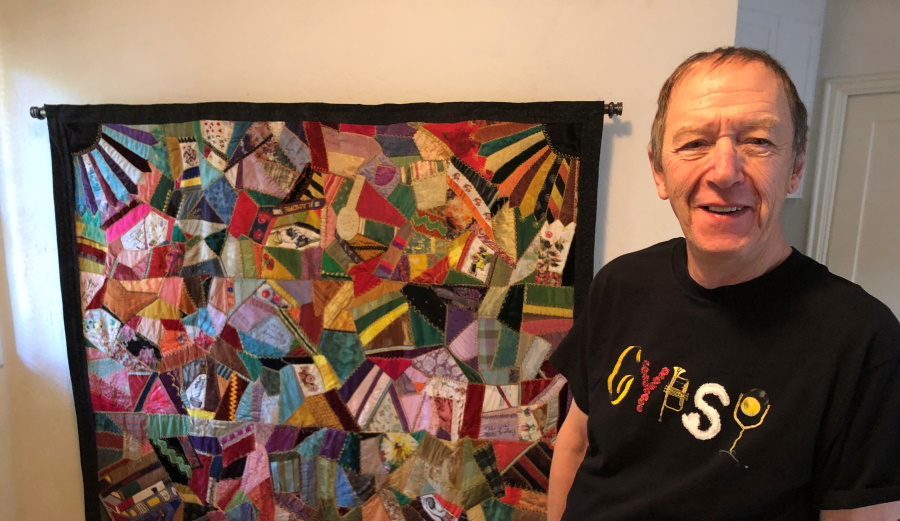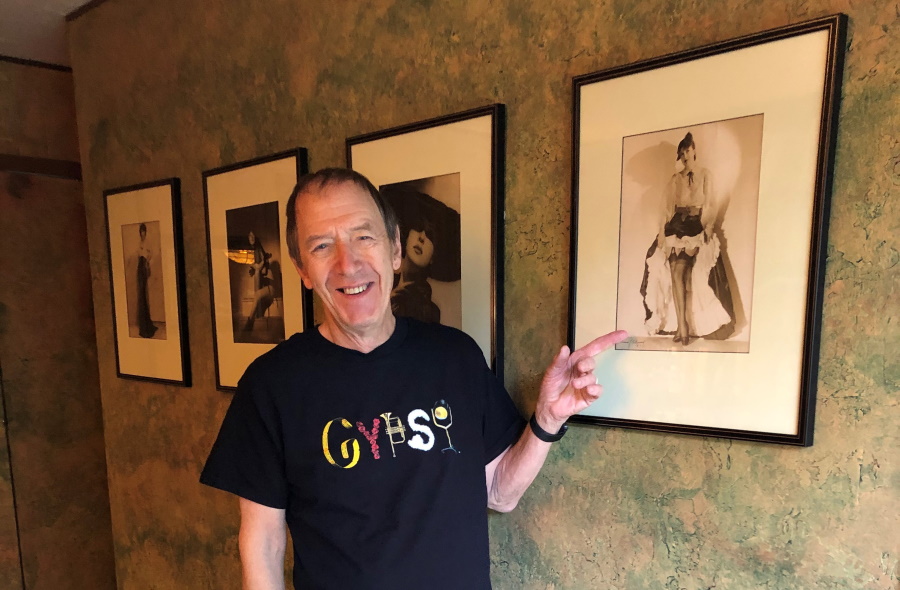From “Ya Gotta Get a Gimmick” to “Rose’s Turn,” the musical Gypsy has many unforgettable musical theatre moments. But for Erik Lee Preminger, the son of the musical’s titular legend, the best part of the show is when grown-up Louise steps up and becomes the stripper Gypsy Rose Lee. Finally standing up to her pushy mother, Rose, she declares that she loves herself just as she is.
“Mother loved being Gypsy Rose Lee,” Preminger, now 75, affirmed in an interview at his home last month. “She was a trouper,” he said. “That’s one thing her mother gave her. She used to tell me how, when she was younger, they drove from place to place in the winter and the cars didn’t have heaters. They would use blow torches sitting on the floor of the cars to keep them warm. It was not an easy time, but it made her stronger.”
Just as the musical Gypsy follows the famous striptease artist’s real-life journey to the spotlight, her son now follows productions of the show around the country, doing one-man presentations about his life with the real Gypsy. He’ll next do it tonight, Jan. 15, in Naples, Fla., at the TheatreZone, which will produce the musical March 5-15. Preminger is also the author of the 1984 memoir My G-String Mother: At Home and Backstage with Gypsy Rose Lee. Through his eyes, we see the woman’s humor, show-biz grit, thrift, pizzazz, even a bit of her narcissism.
“It’s a wonderful story,” says TheatreZone artistic director Mark Danni. “Erik is probably the last living person who can tell you about Gypsy as a person.”
And Preminger has many stories to tell. Erik, whose father was legendary theatre and film director Otto Preminger, was just six months old when his mother took him on the road in 1945. Growing up around the burlesque business became an everyday thing; pasties, G-strings, and the flash of flesh were quite normal. “With my mother, it was part of the job,” he said. “But at home she was very modest.”
When he was four, they traveled for 39 weeks with a large carnival. Gypsy was the headliner doing more than a dozen shows a day. Preminger got free access to all rides and unlimited cotton candy. “I was sort of like the carnival pet,” he recalled.
Gypsy’s act included a bevy of showgirls who stepped onstage half-dressed. Gypsy, like a fairy godmother, would drape them. “She also did a posing show,” Erik said. “In those days, you could appear almost naked if you did not move. It was very, very risqué. In many places, they also covered the front.”
Still, though, an air of propriety reigned with Gypsy, whom Preminger still only refers to as “Mother.” Manners were taught and responsibility expected. “My mother was very conscious of her reputation. She was very proper and just a little bit pretentious.”
Pinching pennies was also often a necessity. Her favorite way to hit the road was with a small trailer. When they did stop at hotels, she would pull out the hot plate and frying pan and put the milk on the window ledge to keep cold. Once, when the act played the Riviera in Las Vegas, Gypsy and her entourage were kicked out of the hotel because of the smell of the food.
“She used to make great fried chicken,” Preminger recalled. “When we were traveling with the girls, she’d make it for everybody, then take the leftovers in the car for lunch. She would fry up thin steaks and fry bread in grease. That was wonderful.”
Christmases were usually on the road, which meant opening presents next to the Christmas tree in the hotel lobby. At the Desert Inn in Las Vegas, Gypsy had a complete electric train set installed in the lobby for Preminger when he was six.
When he was a little boy, they sailed to England and Gypsy gave him his first job with her act: picking up the straight pins from costumes after they were thrown into the audience. The European circuit lasted about a year and a half, during which Gypsy bought her first Rolls-Royce. When she drove it through Switzerland in the winter, they got stuck in the snow at the Simplon Pass. “She tried to dig us out using a bidet she had stolen from a hotel,” he said. “It was quite an adventure. She had incredible fortitude.” (A Swiss mountaineer eventually rescued them.)
Back in the U.S., Preminger helped with something new in the act: a shadow box that would show her changing into strapless costumes. “All you’d see were my little arms doing hook and eyes and zipping up the dress,” he says. His job soon expanded to walking their small dogs, being her gofer, and even her own personal photographer.
He learned to drive at 14 so he could take the Rolls-Royce down lone stretches of road while she fixed herself tea. He was also helping her run lines and was her dresser in summer stock.
Her turn as Auntie Mame in Warren, Ohio, required 40 lightning-quick costume changes and eight wig changes. He loved watching his mother in the role, which he said resonated the most with her personality. “For her curtain call, she’d go out and talk to the audience,” he says. “She had a great wit and humor, and it was the best part of the evening. On one occasion, she introduced me. I was furious with her. I had no idea what to do in front of an audience.”
His anger vanished, though, when Gypsy took him to the Ohio Department of Motor Vehicles and charmed officials into believing he was 16 and deserved a license. He was 15. He got the license.

Big-name celebrities were commonplace in their lives. Theatre impresario Billy Rose visited their Manhattan home. Theatrical producer Leonard Sillman gave Preminger overly large hand-me-down suits. Gossip columnist Hedda Hopper would bring men’s ties to quilting bees in Gypsy’s living room.
One of his prized possessions is a vivid handmade quilt hanging in his Northern California home, which is composed of men’s ties, swatches of costumes, embroidery, souvenirs from travels, and bits from flea markets.
The presence of celebrities was simply routine to the young Preminger, but he especially remembers one encounter at a basement party given by his mother’s tenant, singer Boyd Bennett. “Tennessee Williams went to parties Boyd would give,” Preminger said. “I would sit on the stairs and the whole room would fill with smoke, and there was Tennessee Williams reciting his poetry. It was a magical moment for me.”
The only person not welcome at these gatherings was Gypsy’s mother, Rose Hovick, the stage mom immortalized in the musical. Gypsy had told Preminger stories about Rose killing two people (a lover and a hotel manager), and then one day Rose appeared at the door and took a big pistol out of her purse. It was the first time he met his grandmother.
“She said, ‘I bet you like guns’,” he recalled. “It was very heavy and I could barely lift it. It was the kind Army officers used to carry.” Preminger ran upstairs to tell his mother that Rose was in the foyer. “She told me, ‘Hurry downstairs—make sure she hasn’t fingered the Picassos’,” he said.
The high water mark came with the production of Gypsy in the spring of 1959. The show, with a book by Arthur Laurents, music by Jule Styne, and lyrics by Stephen Sondheim, had been inspired by Gypsy Rose Lee’s 1957 New York Times bestseller, Gypsy: A Memoir. “Grandma Rose had died, so Mother felt free to write the story about her childhood without fear of being sued,” Preminger said.
At the opening of what would become a smash hit and run for 702 performances on Broadway, he said he could feel people in the standing-room-only audience looking at him and his mother. “It was a very moving evening,” he says. “I felt so proud. That was her life. That was the persona she created all by herself.”
Member of the American Theatre Critics Association, Pam Harbaugh reviews theatre for Vero Beach News and FloridaTheaterOnStage.com





